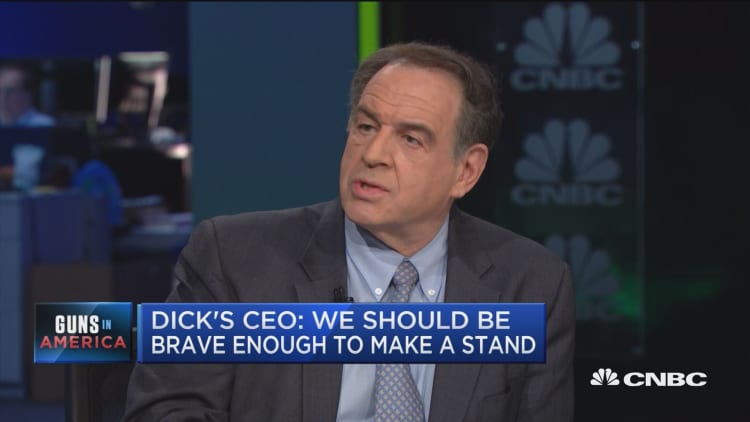
Yale School of Management's Jeffrey Sonnenfeld said not taking a firm stance on gun control is "cowardly" and "doesn't make sense."
"You vote with your dollars," he told CNBC on "Power Lunch" on Wednesday.
Sonnenfeld said 67 percent of American gun owners want more regulation, while roughly 70 percent of all Americans are in favor of banning assault weapons. A whopping 97 percent of Americans want enhanced background checks, according to a recent Quinnipiac University Poll.
And companies may be feeling the pressure. Since the Feb. 14 Parkland, Florida, high school shooting that killed 17 people, approximately 20 companies have cut ties with the National Rifle Association. The list includes First National Bank of Omaha, Enterprise, Symantec, Hertz, TRUECar, Avis, UPS, MetLife, Paramount RX, Delta, United Airlines, Allied, Starkey and SimpliSafe.
Wednesday morning, Dick's Sporting Goods, the largest retailer of sporting goods in the U.S., joined that list when it released a statement saying it was "deeply disturbed and saddened by the tragic events in Parkland" and thus would no longer sell assault-style rifles.
Meanwhile, companies such as HotelPlanner.com and FedEx say they refuse to enter into what one called a "boycott war."
But Sonnenfeld said, "The boycott of being on the wrong side [of public opinion] is much more significant than the boycott of [being on the right side]."
He said FedEx, which announced Monday that it would not end discounts for NRA members, is "on the wrong side."
FedEx did not respond to a request for comment.
But with customers on both sides of the political divide, it's not easy for companies to take a side, said Steve Odland, chief executive officer of the nonprofit Committee for Economic Development.
"It's difficult for business leaders to take a side without alienating some people," Odland told CNBC. "By doing that, some piece of their constituents may be happy, but they are offending some portion of their business."
Sonnenfeld referenced more than one time in U.S. history when a company or CEO took a "moral stand," including Merck CEO Kenneth Frazier, who resigned from President Donald Trump's manufacturing jobs council last summer after the president's response to the violence in Charlottesville, Virginia. Other members of the council quickly followed suit.
Tobacco companies in the 1970s were forced "kicking and screaming," Sonnenfeld pointed out, to remove tobacco advertisements from television.
"I think business is going to rally. It's a watershed moment," he said.


